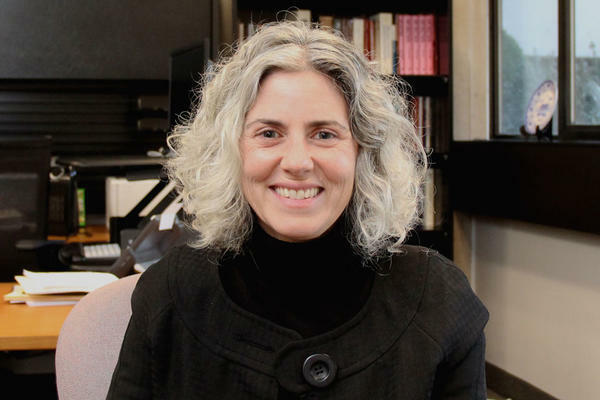Black Struggle in Yiddish Literature
From the June 14, 2020 Issue of the Weekly Reader
Many of us know about the role of Jews in the civil rights movement. We think of the Freedom Riders Andrew Goodman and Michael Schwerner, who, together with James Cheney, were shot and later buried on a lonely levee in Mississippi. Or we recall the iconic photo of Rabbi Abraham Joshua Heschel marching arm-in-arm with Dr. Martin Luther King, Jr. Most of us are less familiar, however, with representations of black struggle in the pages of Yiddish literature. In this issue of the Weekly Reader, our bibliographer, David Mazower, has chosen five selections from our collection: an epic Yiddish poem about school integration in Little Rock, Arkansas; a popular Yiddish play based on the trial of the Scottsboro Boys; a Yiddish translation of poems by Langston Hughes; a short story about a lynching in a small southern town; and a volume of stories for children about race in America, published by the Workmen’s Circle. As the struggle continues, I think you’ll find these words and images as relevant today as they were when they first appeared.
—Aaron Lansky, Yiddish Book Center founder and president
***
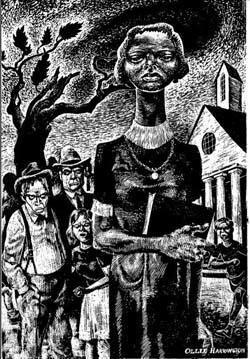
Di balade fun litl-rak (The Ballad of Little Rock), an Epic Poem by Dora Teitelboim
Little Rock, Arkansas, exploded into the American consciousness in September of 1957, when nine black pupils set off to attend Central High, a school of 1,900 white students. After a three-week standoff during which they faced National Guard troops and hate-filled white protesters, they finally made their way into class. One of the most extended fictional responses to their plight is this epic poem by Dora Teitelboim, a well-known poet of the American Yiddish left who immigrated from Poland to the US in 1932. Published in Paris in 1957, her poem is accompanied by a powerful illustration from the celebrated African American cartoonist and civil rights activist Ollie Harrington.
***
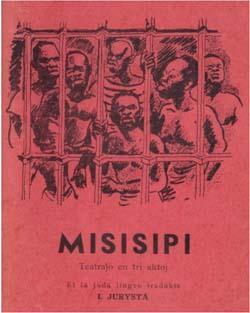
Mississippi, a Play by Leyb Malakh, Written in 1933
The case of the Scottsboro Boys—nine African American teenagers falsely accused of raping two white women—is one of the most infamous episodes of racism and injustice in American history. It transfixed the country in the 1930s and prompted many Yiddish poems about the youngsters’ suffering both during the trial and after. It also produced Mississippi, an episodic play by Polish Yiddish writer Leyb Malakh. Presented over 100 times in Poland, it was also translated into French, Hebrew, and Esperanto (pictured). Alyssa Quint, who is translating the play, calls it “an unflinching look at racism of the Jim Crow era.” She describes an acclaimed 1935 Warsaw production in which “actors representing white characters stood on higher platforms than actors representing black characters, to emphasize their fatal inequality in American society.”
Read the play (begins on page 253)
***
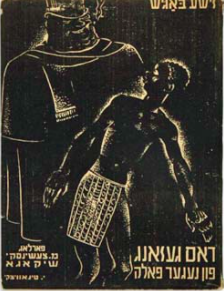
Dos gezang fun neger folk (The Song of the Negro), Poems by Langston Hughes
Translated by Zishe Bagish (Chicago, 1936)
Just as Yiddish poets translated Walt Whitman, Rilke, and Yeats, bringing them into the capacious embrace of modernist Yiddish culture, they approached the work of Langston Hughes in the same spirit. A clarion cry like Hughes’ poem “Let America Be America Again,” with its repeated line, “It never was America to me,” resonated powerfully with Yiddish poets of the left. One of those was Zishe Bagish. Born into a rabbinical family in Lodz, he lived all over Europe before returning to Poland in the late 1930s. His book Dos gezang fun neger folk (The Song of the Negro) combined translations of Hughes’ poems with African American spirituals. It also features a stunning cover illustration by the Polish Jewish artist Y. Tinovitski. Bagish died in Auschwitz, reportedly volunteering himself for the gas chambers to save younger and healthier prisoners.
***
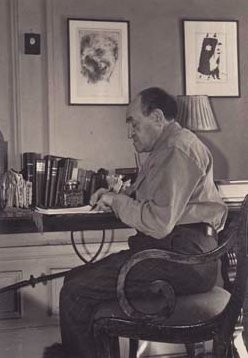
Rase: lintsheray un andere dertseylungen (Race: Lynching and Other Stories) by Joseph Opatoshu
Joseph Opatoshu had a considerable reputation in both the US and Poland by the time he published the story “Lynching” in 1923. His novels and stories tackled difficult and controversial subjects— social upheaval, criminality, eroticism, violence, and unbridled sexuality. “Lynching” is a shocking and graphic description of the hunting and burning of a black man by a white mob. At the same time, it’s a deeply problematic text for the modern reader. As its translator Jessica Kirzane notes, “Opatoshu, in writing against American racism, nevertheless holds and perpetuates racist attitudes.” A text, then, that is both powerfully anti-racist and racist at the same time, “Lynching” is a reminder that true solidarity demands that we confront our own prejudices.
Read the translation by Jessica Kirzane
***
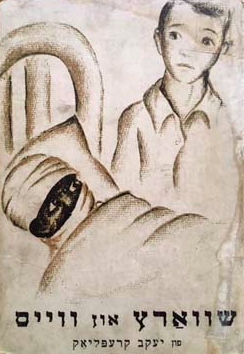
Shvarts un vays (Black and White), Stories for Children by Yankev Krepliyak
There are at least two books of fiction in Yiddish about racial oppression with the stark title Shvarts un vays (Black and White). One is by the South African writer Rakhmiel Feldman. The other is a collection of stories for children by Yankev Krepliyak. Published by Der Arbeter Ring (Workmen’s Circle, now The Workers Circle) in New York, it was part of a sustained effort by Yiddish writers and educators in America to enlighten children within the Yiddish school system. Krepliyak’s stories are full of encounters between white and black children, with full page illustrations by Leah Port. To browse the drawings, simply turn the pages using the online reader.
Read the stories and view the drawings
Thanks to the Yiddish Book Center's bibliographer and editorial director, David Mazower, for these selections.

